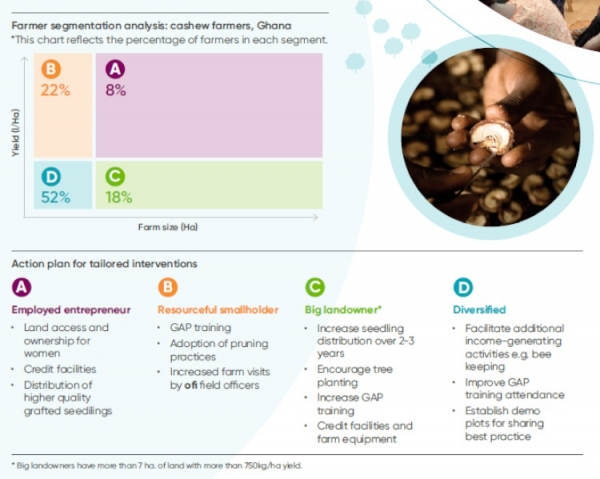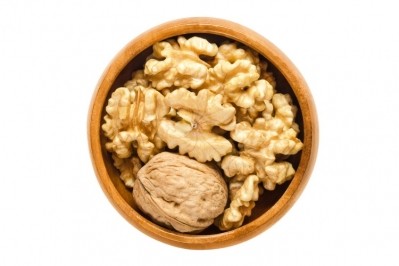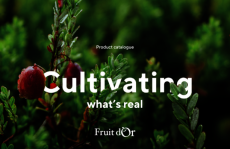ofi ticks up the milestones in first Nuts Trails impact report
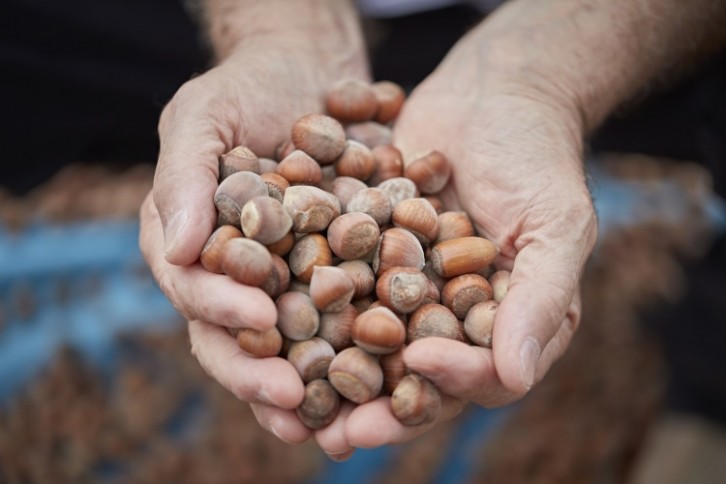
Nuts have seen a resurgence in popularity, particularly as the plant-based trend gains momentum and the sector predicted soar from £13.6bn in 2021 to $115.3bn by 2035 (a 16.5% CAGR). With 43% of Gen Zs claiming to ditch meat from their diet in 2023, on top of the 16% that already have, a massive 59% of this generation could be meat-free by the end of the year. And so, the plant-based sector continues to innovate with new alternative proteins and textures.
According to olam food ingredients (ofi), consumers are opting for cashews and hazelnuts over options like soy and oats because of the taste and perceived nutritional benefits.
ofi’s consumer research - conducted by InSites Consulting - is based on quantitative survey of 1,508 consumers (Germany, France, United Kingdom, Sweden, and Italy) in November 2022.
“Our own consumer research last year pinpointed nuts as a popular choice in formulating plant-based products, with cashews and hazelnuts, as well as almonds, strongly associated with being tasty, natural and healthy,” said Ashok Krishen, CEO nuts, ofi.
“We also know consumers are motivated by traceability, with 75% of those we surveyed saying they are willing to pay more for a sustainable product.”
But, while the majority of consumers have the means to pay extra for their treats, nut farmers in countries like Côte d’Ivoire, Vietnam and Turkey are not as fortunate, with the majority unable to meet their own health and nutrition needs.
The majority of cashew farmers are smallholders and their farms are their main source of income. The price they are paid for their crop is driven by a competitive international market, but that often doesn’t translate into a decent profit. Poor working conditions, inadequate health services and limited education also hamper take-home pay, while the effect of climate change are threatening crop yields and quality.
Regenerating communities
In Nigeria, for example, almost 30% of cashew farmers live below the poverty line. The average income of cashew farmers in 2020 was N134,517.14 (US$175), while the poverty line was N89,678.09 (USS$117).
In Côte d'Ivoire, malnutrition contributes to the stunted growth and development of 1 in 5 children, according to Unicef/World Bank/WHO joint malnutrition estimates.
Last year, ofi’s cashew teams partnered with the country’s National Nutrition Program (PNN) to geo-locate and screen over 2,500 children in cashew communities using the Infant Malnutrition System Alert (IMSA) smartphone-based app, developed by one of ofi’s sustainability analysts Stephanie Konan.
As a result, 49 cases were identified and referred local medical authorities to ensure correct treatment.
Nearly 3,000 children under the age of 18 were registered on ofi’s Child Labor Monitoring and Remediation System (CLMRS) app, which enables the company to take immediate action if a child is identified at risk. A lack of childcare facilities can increase the risk of child labour as migrant worker parents are left with no choice but to bring their children with them onto farms. To counteract this during the harvest season, ofi’s team hosts a variety of activities like a summer school in Turkey, run in partnership with the Ministry of Education.
Last year, ofi Côte d'Ivoire launched Project 99, focused on providing clean water. Only 15% of people in rural areas have access to safe drinking water, so ofi installed 10 water borewells in different villages across the country. The Project also provided ofi’s factory workforce - 80% of which are women - with access to one of the first daycare centres, which also provides a dedicated area for breastfeeding mothers.
A similar programme was rolled out in Vietnam, in partnership with NGO Alive & Thrive, to support female employees in their breastfeeding journey when returning to work. Online trainings was also conducted for employees and management teams to ensure support is given to all pregnant women and new mothers in the workplace.
In Turkey - which produces two-thirds of the world’s hazelnuts and relies on a large migrant workforce for the harvest season - over 1,500 female workers received health screenings and advice by ofi social workers to manage conditions like diabetes and anaemia.
“Our own research shows 58% of consumers expect to increase their plant-based consumption in the next two years and nuts are set to be at the heart of that growth, with cashews and hazelnuts, as well as almonds, strongly associated with being tasty, natural and healthy,” said Krishen.
“But as well as doing good for consumers, it’s important the nuts we source for our customers are also good for the people and communities that produce them.
“Together with our customers and partners, our teams on the ground work in and with these communities to improve access to vital health services and nutrition advice, as part of our strategy to find more creative, productive and sustainable ways of supplying cashew and hazelnut ingredients.”
2030 targets
ofi's Nut Trails Impact Report 2022 also details progress made by ofi’s cashew and hazelnuts teams over the past year against its 2030 targets to:
Train 100% of hazelnut workers on gender equality, labour and children’s rights (100% achieved, including 2,292 in ofi’s supply chain + 4,060 other farmers).
Distribute US$4m in premiums to help cashew farmers get the best possible value from their crop (US$1,014,330 dispersed last year).
Conduct soil analysis for 10,000 hazelnut farmers to optimise fertilizer use (over 700 reached last year).
Additionally, 100% of farmers (20,000+) were trained on Good Agricultural Practices, including crop residue and composting management. The company is targeting 250,000 farmers to be trained on climate-smart agricultural practices and waste reduction by 2023.
Hazelnut supply chain traceability increased by 11% in 2022.
In Ghana, positive results so far include 55% yield increase, recorded from 409 farms in category B due to adoption of advice on timely pruning and pest management.
“In 2021, we published our Cashew and Hazelnut Trail strategies, setting out a roadmap to find more creative, productive and sustainable ways of supplying cashew and hazelnut ingredients,” said Krishen.
“We set dedicated 2030 targets aligned with the UN Sustainable Development Goals to scale up our impact on the most pressing issues in these supply chains by working with partners to improve farmer profitability, protect the rights of children and workers and empower women in these farming communities.”
Added Burcu Turkay, global head of Sustainability, Nuts, ofi, “The data we’re collecting at every step of the supply chain - from farm to factory - tells us where we’re making a difference and how we can have even greater impact,”
“Not only that, but our customers can partner with us and track the performance of their own supply chains via our sustainability management system, AtSource.
“Together, it means that when they buy our ingredients, they can be confident these will not only deliver on flavour and functionality, but also add value for farmers and communities.”
Study:
Analysis of the poverty status of cashew farmers in Kogi State, Nigeria
Authors: J.J. Pelemo, U. Mohammed, et al
Agrosearch, Vol. 19 No. 2 (2020)
10.4314/agrosh.v19i2.2

![ofi_male_nuts_farmer[1]](/var/wrbm_gb_food_pharma/storage/images/_aliases/reference/media/images/ofi_male_nuts_farmer-1/16846266-1-eng-GB/ofi_male_nuts_farmer-1.jpg)
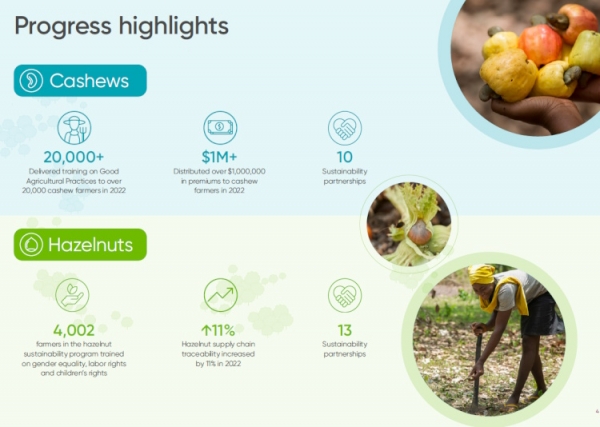
![ofi_female_nuts_farmer[1]](/var/wrbm_gb_food_pharma/storage/images/_aliases/large/media/images/ofi_female_nuts_farmer-1/16846284-1-eng-GB/ofi_female_nuts_farmer-1.jpg)
